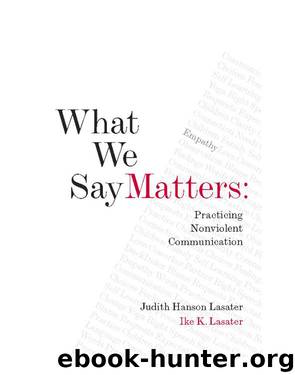What We Say Matters by Ike Lasater

Author:Ike Lasater
Language: eng
Format: epub
Publisher: Shambhala
Published: 2010-06-27T16:00:00+00:00
THE JOY OF INTERRUPTING
Marshal Rosenberg reports that, in some countries in the world, no one will interrupt you, even in an unproductive conversation, but will wait until you are finished before they speak. In other countries, however, people tend to talk all at once in gatherings and meetings. The advantage of this, he jokes, is that they can have the same unproductive conversation in half the time!
I now believe that no one ever interrupts me. That is not to say that people do not occasionally speak when I am speaking. But I choose not to hear this as interruption. Instead, I choose to hear their enthusiasm about sharing something with me. I believe that perception does not shape your life; it is your life.
If I tell myself that you are interrupting me, I might feel irritated because my need for respect is not being met. If I understand your “interrupting” as your eagerness to give me your insight or idea, I would feel quite different. Either way, I am creating my own environment. Minute by minute, we all shape our internal environment, and from that comes the happiness or suffering of our lives. Using the tools of self-empathy and then empathy for the other allows us to hear their words not as rudeness but as an exchange we can enjoy.
But what about interrupting someone else? Is there ever a time to do that? When I was growing up, interrupting anyone at any time was strictly prohibited. So when I first heard Marshall Rosenberg speak about the importance of sometimes interrupting someone else, I was shocked. I wondered how interrupting could ever be nonviolent.
But I have shifted on this issue. Here’s why. First, if I listen to you past the time I am interested or truly able to hear, I am actually disconnecting from you and doing violence to myself. Before in my life when I felt disconnected from a conversation, I pretended to listen to be polite, but I’m now sure that my eyes glazed over and the other person knew I was tuning out. Other people know when we are not present. They often respond by moving closer, speaking louder, or repeating the story. Is it really practicing ahimsa to pretend to listen when we aren’t?
I have since learned to respond in another way. When I feel myself drifting away from what another is saying to me, first I tune in to myself to see what is alive in me; this involves silent self-empathy. Then I might say something like, “I’m hearing that you’re excited to tell me about this, but right now there are more words than I can take in because I’m tired (assuming it is true that I am feeling tired). Can we pick another time to have this conversation when I’m predicting I’ll be more able to listen?”
Another way is to first acknowledge what is going on for you at that moment. It might sound like this: “I hear that you really want to share this story with me, but I’m not able to listen fully because I’m feeling pressed for time.
Download
This site does not store any files on its server. We only index and link to content provided by other sites. Please contact the content providers to delete copyright contents if any and email us, we'll remove relevant links or contents immediately.
Cecilia; Or, Memoirs of an Heiress — Volume 1 by Fanny Burney(32559)
Cecilia; Or, Memoirs of an Heiress — Volume 2 by Fanny Burney(31957)
Cecilia; Or, Memoirs of an Heiress — Volume 3 by Fanny Burney(31943)
The Lost Art of Listening by Michael P. Nichols(7507)
Asking the Right Questions: A Guide to Critical Thinking by M. Neil Browne & Stuart M. Keeley(5778)
We Need to Talk by Celeste Headlee(5617)
On Writing A Memoir of the Craft by Stephen King(4947)
Dialogue by Robert McKee(4405)
Pre-Suasion: A Revolutionary Way to Influence and Persuade by Robert Cialdini(4234)
I Have Something to Say: Mastering the Art of Public Speaking in an Age of Disconnection by John Bowe(3890)
Elements of Style 2017 by Richard De A'Morelli(3350)
The Book of Human Emotions by Tiffany Watt Smith(3309)
Fluent Forever: How to Learn Any Language Fast and Never Forget It by Gabriel Wyner(3087)
Name Book, The: Over 10,000 Names--Their Meanings, Origins, and Spiritual Significance by Astoria Dorothy(2987)
Why I Write by George Orwell(2955)
Good Humor, Bad Taste: A Sociology of the Joke by Kuipers Giselinde(2951)
The Art Of Deception by Kevin Mitnick(2804)
The Grammaring Guide to English Grammar with Exercises by Péter Simon(2744)
Ancient Worlds by Michael Scott(2690)
